-
- Market Research
- |
- CBD Near Me
- |
- Giveaways
- |
- Newsletter
- |
- Contact
- |
- Advertise
- |
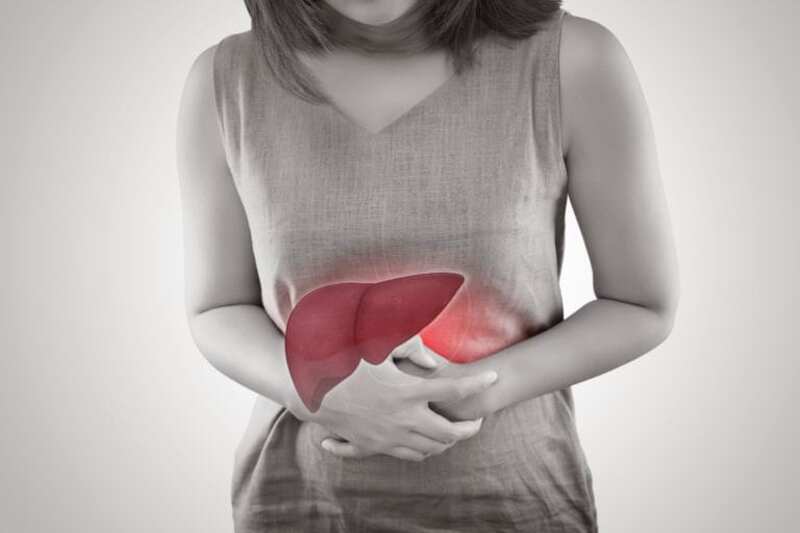
Liver disease is a potentially life-threatening condition that affects millions of Americans. Thankfully, cannabidiol (CBD) has been shown in a growing number of studies, such as a 2011 study by scientists at the Mount Sinai School of Medicine in New York, to prevent the progression of fibrosis, a major process in the progression of liver disease. In addition to preventing fibrosis, CBD reduces liver inflammation and may even restore liver function, making it a viable treatment option for liver disease.
An Overview of Liver Disease
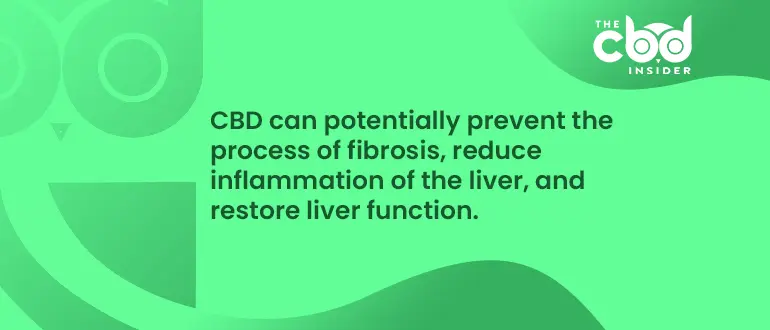
Liver disease is a broad term for several conditions that affect the function of the liver. Many factors can cause liver disease such as infections, abnormal immune system responses, genetics, cancer, and excessive fat.
Some common forms of liver disease include:
- Infectious liver diseases such as Hepatitis A, B, and C
- Autoimmune hepatitis
- Hepatic encephalopathy
- Liver cancer
- Bile duct cancer
- Fatty liver disease (often caused by obesity and excessive alcohol consumption)
- Non-alcoholic fatty liver disease
| DISEASE | DESCRIPTION |
| Infectious | A virus infecting the liver (e.g. Hepatitis B & C) and causing inflammation |
| Autoimmune | The immune system mistakenly attacks the liver |
| Fatty | The liver becomes filled with fat which causes inflammation |
| Cancer | The cells in the liver mutate and become cancerous |
According to the American Liver Foundation, about 5.5 million people have chronic liver disease or cirrhosis (scarring of the liver due to liver disease). Twenty to thirty percent of American adults have excess fat in their liver, which can lead to liver disease. An estimated 4.4 million have Hepatitis B or C, and most people are unaware they have it.
Liver cancer cases have tripled since 1980 and 30,000 Americans die each year from it.
General Symptoms of Liver Disease
Several manifestations of liver disease exist, but most liver diseases will share similar symptoms once the liver begins to fail:
- Jaundice (yellowing of the skin)
- Swelling in the legs and abdominal area
- Abdominal pain
- Dark urine
- Fatigue
- Nausea
Prior to liver failure, symptoms tend to reflect the type of liver disease an individual has.
How Does Liver Disease Work?
Before understanding how CBD can treat liver disease, it is important to know how liver disease occurs and progresses.
Pathophysiology of Liver Disease
The liver has several functions including removing toxins from the blood, helping digest food, and storing energy. The liver can also regenerate after injury and damage. However, a disease can prevent the liver from functioning or healing properly.
When the liver becomes diseased, inflammation often occurs as the immune system attempts to remove the disease. Most people do not feel this inflammation. If the disease is treated and cured by this stage, inflammation should subside.
However, if the disease lasts too long, the constant inflammation can lead to scarring of the liver (a process called fibrosis). The scar tissue replaces healthy tissue, which can restrict blood flow and hinder the liver from functioning correctly.
If fibrosis persists, it leads to cirrhosis. Cirrhosis is a progressive condition where the scar tissue in the liver has caused permanent damage, inhibiting the liver’s ability to function. Cirrhosis cannot be cured and eventually leads to liver failure without proper treatment.
Liver failure occurs when the liver loses its ability to function, a life-threatening occurrence that requires surgery or a liver transplant.
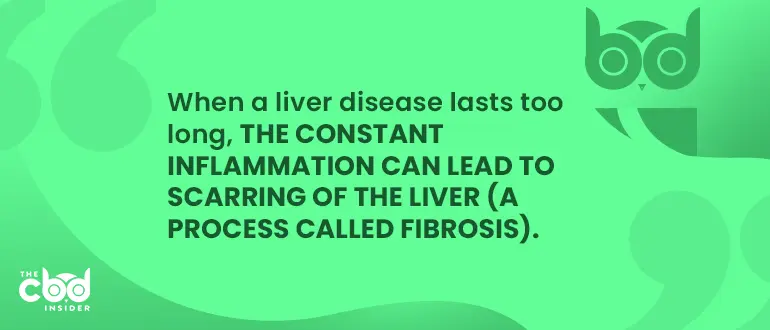
The Endocannabinoid System and Liver Disease
The endocannabinoid system (ECS) has been shown to become hyperactive when liver disease occurs. Research by French researchers from various institutions in Créteil, France shows that the ECS plays a role in various liver diseases, as well as the progression of fibrosis to cirrhosis.
The activation of the CB1 receptor seems to promote factors contributing to liver disease including fat accumulation and the formation of scar tissue. However, activation of the CB2 receptors appears to have protective effects for liver cells, such as hindering scar tissue formation and producing anti-inflammatory effects.
The imbalance of the ECS in the liver may be a major factor in the development of liver disease; thus, the CB receptors offer a potential therapeutic target.
Medication for Liver Disease
Antiviral medications are used for the hepatitis B and C viruses. Another medication called Interferon can also treat hepatitis B and C by acting like a group of proteins the body produces on its own to fight infections.
Autoimmune hepatitis is usually treated by steroids like prednisone or immunosuppressive drugs.
Other medications can include drugs for lowering blood pressure or antibiotics, which are meant to help with the potential complications of cirrhosis.
The side effects of medications for liver disease can be serious and include, but are not limited to, weight gain, diabetes, high blood pressure, weak bones, diarrhea, dizziness, difficulty sleeping, back pain, and depression.
On the other hand, CBD may be a safer and potentially effective alternative to traditional medications.
Studies on CBD for Liver Disease
| STUDIES | HOW CBD HELP |
| CBD and Fibrosis | CBD prompted the natural deaths of cells that promote fibrosis of the liver. |
| CBD and Liver Transplant | CBD reduced the potential damage that can occur after liver transplants. |
| CBD and Autoimmune Hepatitis | CBD helped activate regulatory cells in the immune system to reduce inflammation. |
| CBD and Hepatic Encephalopathy | CBD restored some cognitive function and reduced the level of toxins in the blood. |
| CBD and Hepatitis C | CBD was found to have antiviral benefits and successfully treated hepatitis C. |
Research on CBD shows exciting treatment potential for liver disease. One benefit CBD has is its ability to protect the liver. CBD protects liver tissue by slowing down the process of fibrosis, reducing inflammation, decreasing oxidative stress, and inhibiting the death of healthy cells.
Another benefit of CBD is its ability to modulate the immune system, making it a useful therapy against autoimmune hepatitis. CBD might also help restore lost liver function, such as removing toxins from the body, and has been shown to treat hepatitis C.
The following studies demonstrate these potential benefits of CBD:
Study Shows CBD Inhibits Fibrosis in Animal Model
A study led by from the Department of Pharmacology and Systems Therapeutics at Mount Sinai School of Medicine in New York found that CBD could inhibit the production of fibrosis.
Fibrosis is promoted by hepatic stellate cells (HSCs). When HSCs are activated, they produce excess collagen, which leads to scarring and damage to the liver. Thus, the death of HSCs can help inhibit fibrosis of the liver.
In this study, CBD prompted the natural death of activated HSCs by inducing stress in the endoplasmic reticulum, a part of the cell involved in protein and lipid synthesis. Also, CBD did not affect the harmless, inactive HSCs or hepatocytes (liver cells) in the rats tested.
The researchers concluded CBD is a potential treatment for liver fibrosis.
CBD Protects Against Liver Damage in Mouse Study
Research led by the Laboratory of Physiologic Studies at the National Institutes of Health in Maryland and Raphael Mechoulam, the “father of cannabis research,” discovered CBD displayed protective effects against liver damage after ischemia-reperfusion.
Ischemia-reperfusion (IR) occurs after liver transplant when the tissue is reintroduced to oxygen through the blood after a period of oxygen deprivation. IR can cause oxidative stress, inflammation, mitochondrial dysfunction, and cell death.
The researchers found that CBD significantly reduced liver inflammation, oxidative stress, and cell death after IR. However, CBD did not interact with the CB receptors, indicating it produced its effects through an independent receptor source.
Researchers concluded that CBD “may represent a novel, protective strategy against I/R injury.”
Study Finds CBD Reduces Inflammation in Autoimmune Hepatitis
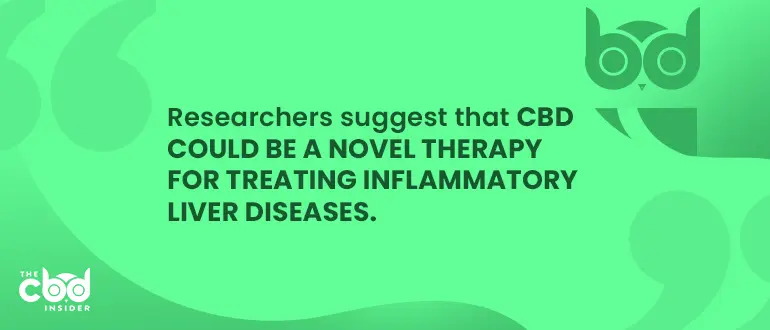
Researchers from the Department of Pathology, Microbiology and Immunology at the University of South Carolina School of Medicine conducted a study on CBD’s activation of myeloid-derived suppressor cells (MDSCs) in autoimmune hepatitis.
MDSCs are regulatory cells in the immune system. They suppress the function of T-cells which produce proinflammatory cells called cytokines, inhibiting inflammation.
To discover the role of MDSCs, the researchers induced mice with experimental autoimmune hepatitis. They then treated the mice with CBD, which activated TRPV1 receptors and triggered the actions of MDSCs.
Results revealed that MDSCs significantly reduced acute inflammation through CBD activation of the TRPV1 receptors.
The researchers suggest CBD could be a novel therapy for treating inflammatory liver diseases, such as autoimmune hepatitis.
CBD May Restore Liver and Cognitive Function in Hepatic Encephalopathy
This study was conducted by researchers from Hadassah-Hebrew University Medical School, Hadassah University Hospital, the Hebrew University of Jerusalem, and the Aristotle University of Thessaloniki in Greece, testing CBD’s effects on hepatic encephalopathy.
Hepatic encephalopathy occurs when the liver cannot sufficiently rid the blood of toxins, leading to a loss of brain function where patients are often forgetful and confused.
Mice were induced to create a model of hepatic encephalopathy and were treated with a placebo or CBD. CBD restored cognitive function and reduced the level of toxins in the blood, which cannot be sufficiently removed by the liver in hepatic encephalopathy.
These results show CBD could be a viable treatment for hepatic encephalopathy.
Study Finds Hepatitis C Treated by CBD
Led by Henry I. C. Lowe, a Jamaican researcher with several decades of experience in medicinal chemistry, this 2017 study revealed that CBD could potentially treat hepatitis C.
CBD’s effects were tested by administering CBD to samples of hepatitis B and C. CBD was found to have antiviral activity against hepatitis C, but not hepatitis B.
The researchers also believed that their results indicated CBD affects autoimmune hepatitis. This finding supports previous research of CBD treating autoimmune hepatitis.
CBD was concluded to have potential as a treatment for hepatitis C.
How CBD Treats Liver Disease
CBD treats liver disease by potentially preventing the process of fibrosis, reducing inflammation of the liver, and restoring liver function.
CBD May Inhibit Fibrosis
Fibrosis is the process of scar tissue replacing healthy tissue in the liver that can ultimately lead to liver failure. Cells called hepatic stellate cells (HSCs), when activated, play a significant role in the development and progression of fibrosis.
HSCs are activated when the liver experiences injury, like in liver disease. Once activated, HSCs produce excess collagen that causes scarring and fibrosis of the liver.
Thus, inducing the deaths of activated HSCs could inhibit fibrosis from progressing or even prevent fibrosis from occurring at all.
According to the study by the Mount Sinai School of Medicine in New York above, CBD can accelerate the natural deaths of HSCs.
CBD does this by changing the form of the endoplasmic reticulum, a part of the cell responsible for protein and lipid creation. This creates a stress response in the endoplasmic reticulum, which eventually leads to the cell’s death. CBD’s effects are also selective, as CBD seems to only target activated HSCs and not dormant cells.
By stopping HSCs from helping form scars, CBD is a viable option for inhibiting and potentially preventing fibrosis.
CBD May Reduce Inflammation
Inflammation is a common occurrence in a diseased liver. It occurs as a response by the immune system to heal damage done to the liver. In autoimmune hepatitis, inflammation is the primary symptom as the immune system mistakenly attacks the liver. If inflammation persists, it can lead to severe liver injury and the start of fibrosis.
T cells are immune cells that cause inflammation by releasing cytokines, which are proinflammatory proteins.
This immune response is regulated by myeloid-derived suppressor cells (MDSCs). MDSCs are regulatory immune cells that suppress T cells. MDSCs are released when activated by a group of receptors called TRPV1.
CBD offers a treatment option for liver inflammation by activating TRPV1 receptors and triggering the release of MDSCs. MDSCs then break down an essential amino acid for the creation of T cells, which seems to be the mechanism by which MDSCs suppress immune function and regulate inflammation.
CBD also suppresses multiple cytokines to reduce inflammation, which can protect liver cells from further damage.
CBD May Restore Liver Function
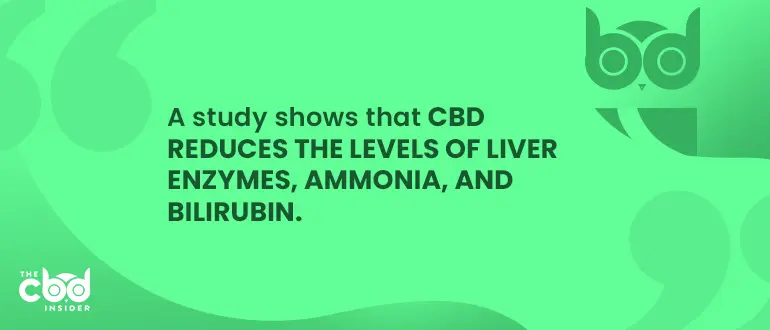
When fibrosis gets worse, cirrhosis can occur. Cirrhosis is a condition characterized by severe scarring of the liver and leaves permanent damage the liver cannot repair. Cirrhosis can affect liver function as well, such as hindering the liver from adequately ridding the body of toxins.
If the toxins are not removed, they can accumulate in the brain and impair several cognitive functions including memory and concentration. Toxins include elevated levels of ammonia and bilirubin.
Ammonia is a waste product created when protein is broken down and can cause confusion, tiredness, and coma if not excreted. Bilirubin is produced by the breakdown of red blood cells and can cause jaundice if allowed to build up, which is a sign of liver disease.
An increase of liver enzymes leaked into the blood can also be a sign of liver disease.
Fortunately, CBD may help restore liver function.
The study above about hepatic encephalopathy shows that CBD reduces the levels of liver enzymes, ammonia, and bilirubin.
CBD’s ability to partially restore toxin levels indicates that it improves the function of the liver to remove toxins from the body. This is another reason why CBD is a promising treatment option for liver diseases.
CBD Has Promise as an Alternative Therapy for Liver Disease Patients
Liver disease is a serious condition that is increasingly prevalent in America. Many people do not realize they have liver disease until their liver is severely damaged, making early diagnosis and proper treatment critical.
Thankfully, researchers have found promising potential in CBD to treat the many forms of liver disease. With its anti-inflammatory properties, ability to inhibit liver scarring, and the possibility to restore some liver functionality, CBD is a viable therapy. Furthermore, CBD seems to have a more favorable safety profile than traditional liver medication.
Liver disease patients can have hope for a healthier life with a safe, potentially effective alternative treatment in CBD.
Have you or a loved one used CBD to treat liver disease? If so, what kind of results did you see? Share your story in the comments below!
Disclaimer: The content on this site is for informational purposes only. We are not medical experts and nothing should be construed as medical advice. Be sure to speak with your physician before taking CBD or any other treatment.





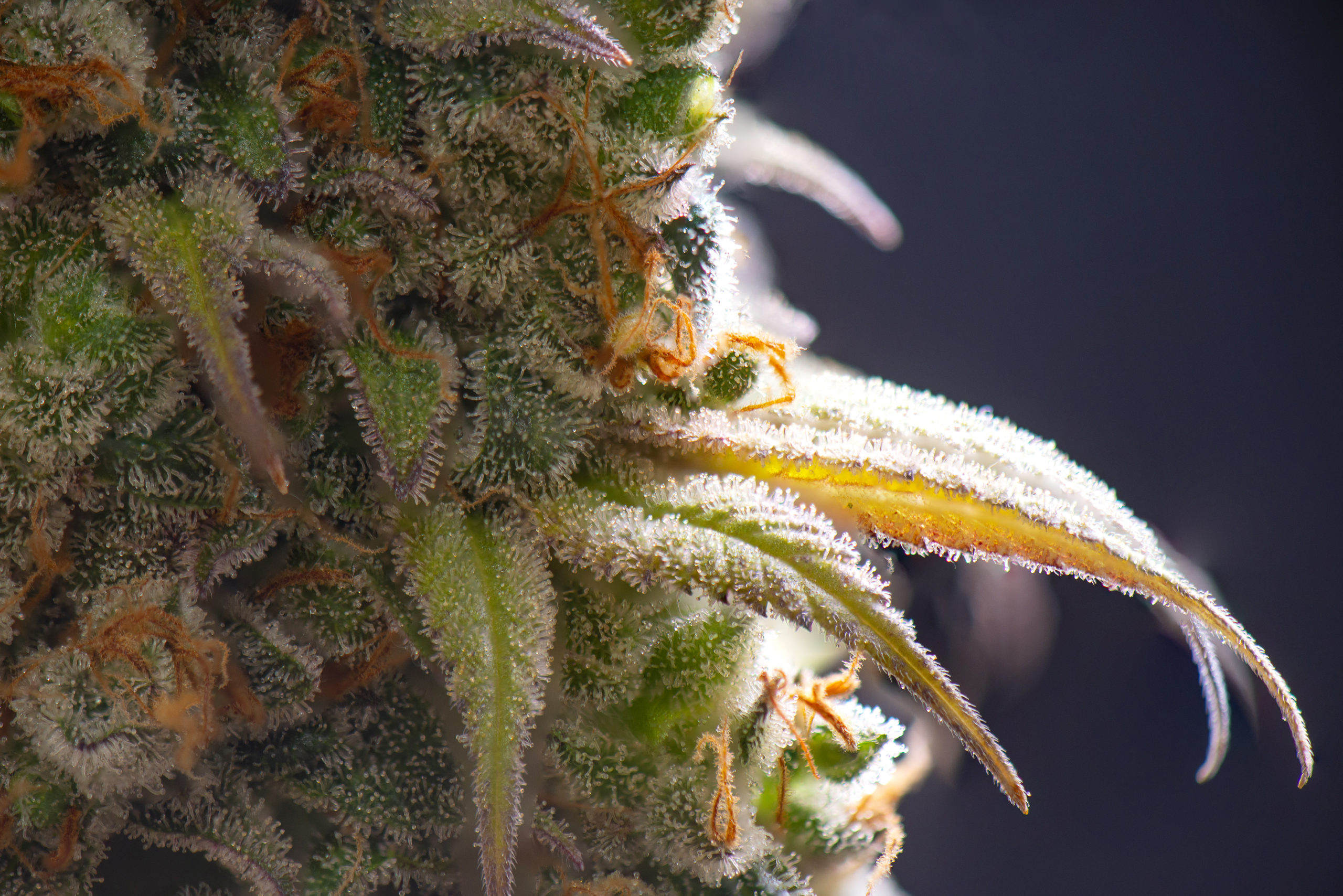

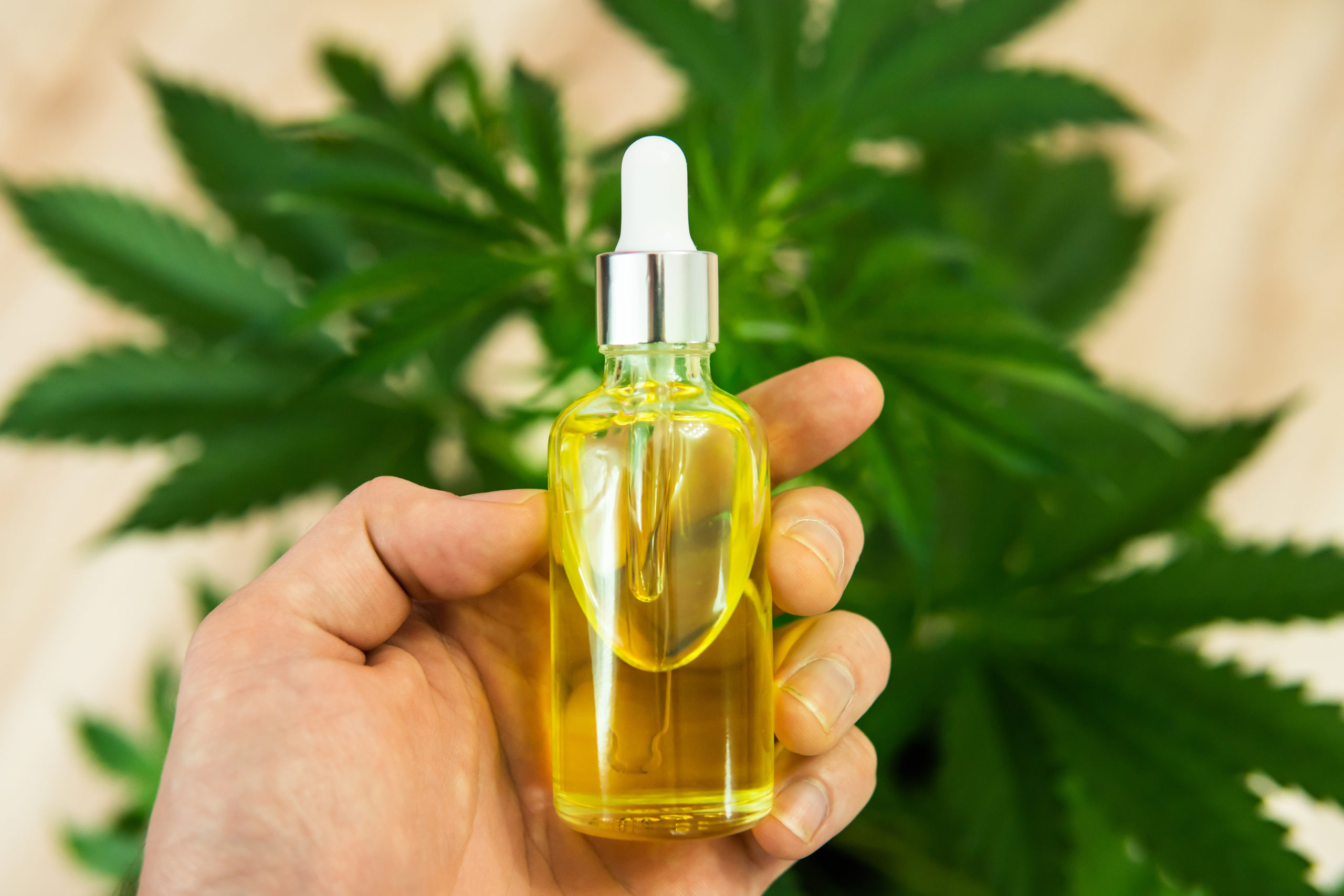
1 Comment
I have been diagnosed with hepatitis B. My HBsAg is positive. HbE is negative and anti-HbE is positive. HCB is negative. Viral load is 7466 IU/ml, and copies/ml is 43452. My symptoms was deep pain in my stomach that i can’t even stand up straight. Second, i found out the yellow colour in the edge of my pupil. Third, loss of appetite to eat. Early this year she started on organic/natural HBsAg treatment. The treatment worked very effectively and all my symptoms simply disappeared completely after 6 weeks of usage and My family doctor confirmed am HBsAg negative. I hope this information will spread.